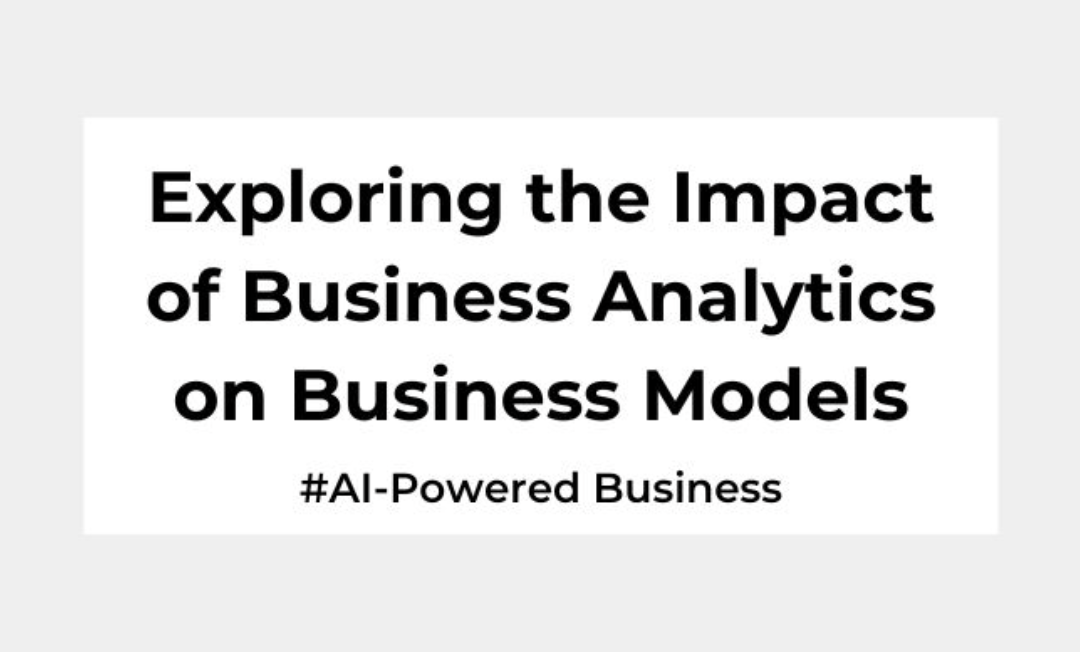Business analytics is a strategic tool that business leaders are increasingly turning to for gaining valuable insights into their business operations. Leveraging data analytics and artificial intelligence, business models can be tested for greater efficiency and effectiveness in tackling business challenges. By taking advantage of business analytics solutions, business leaders can gain predictive insights about customer behavior, market trends, and other business activities, making business decisions easier and more efficient. This article will explore the impact of business analytics on business models and how businesses can benefit from its use.
What is a Business Model?
A business model is a framework that defines how a business operates and creates value for its customers. It details the activities of an organization, such as customer needs, revenue sources, business processes, products and services offered, organizational structure, partnerships with other organizations, and more. A business model also identifies how it will differentiate itself from competitors within its industry. The graphic below shows an example of a business model which follows some of the processes described above in different terms
Elements of a Business Model
The key elements of a business model include value proposition, costs and revenue sources, partners, behavioral elements, channels, and resources. Value proposition describes the benefits customers will receive from an organization, costs and revenue sources define how business operations will be funded, partners identify who business activities are shared with and through what means, behavioral elements describe customer behavior in terms of buying preferences and trends, channels refer to the way business activities are performed (i.e., online or offline), and resources refer to the materials and personnel needed for business operations.
To transform a business model with data analytics, a company should evaluate the available data to better understand the customer, optimize their product or service, and monetize their data and resources.
What is Data Analytics?
Data analytics is the process of extracting business insights from data sets. It involves collecting, cleaning, and analyzing business data to gain useful business information. Data analytics can be used for a wide range of business activities, including marketing automation, business intelligence, customer segmentation, predictive analysis, and more.
For example, using data analytics to analyze customer behavior can inform business decisions on which products to introduce, when and how to launch a new product or service, the types of marketing campaigns that will be most effective, and other business activities.
Data analytics can be used in various business domains to better understand customer behavior, optimize business operations, and leverage data resources. Businesses are increasingly leveraging data analytics to gain a competitive advantage.
One example of data analytics is marketing automation. By automating marketing processes, businesses can quickly and easily gather customer data in order to target customers with personalized messages, offers, and promotions based on their specific interests.
Data analytics can also be used to identify business opportunities. By analyzing customer data such as purchase history and demographics, businesses can gain valuable insights into the types of products or services customers are most likely to buy and when they should launch new offerings.
Effectively leveraging data analytics can also help businesses optimize business processes. By analyzing customer data, businesses can streamline operations, identify inefficiencies, and make better business decisions.
The Impact of Data Analytics on Business Models
Data analytics can have a dramatic impact on business models. By leveraging data to inform business decisions and processes, businesses can gain valuable insights into customer preferences, optimize business operations, and monetize data resources.
Businesses can use data analytics to better understand their customers’ needs, preferences, and behaviors. This information can be used to create more effective business models that are tailored to customer needs and preferences.
Data analytics can also help businesses optimize their business processes. By collecting, analyzing, and leveraging data, businesses can identify opportunities to streamline operations, increase efficiency, and reduce costs. This can lead to improved business performance and better customer experiences.
Finally, it can be used to monetize business data and resources. By leveraging customer data, businesses can identify opportunities to offer additional products or services that customers may be interested in purchasing. Additionally, businesses can use data analytics to improve pricing strategies and identify other revenue sources. The graphic below highlights how data analytics are a big part of the technical foundation needed to capture value in business processes.
As business models become increasingly complex and competitive, it is important for businesses to take advantage of data analytics to maximize business performance and gain a competitive edge. Data analytics can help businesses better understand their customers, optimize business operations, and monetize business resources. By leveraging data effectively, businesses can transform their business models and gain a strategic advantage over competitors.
Unlocking the Power of AI to Transform Business Models
In addition to data analytics, artificial intelligence (AI) is another key business tool that can be used to transform business models. AI tools can be used to automate business processes, gain insight into customer behavior, and improve business performance.
For example, AI-powered chatbots can be used to automate customer service inquiries and provide personalized customer experiences. AI-driven marketing tools can be used to identify customer preferences and target customers with personalized messages, offers, and promotions.
AI-enabled business intelligence tools can also be used to analyze large amounts of data in order to gain valuable business insights. By leveraging the power of AI, businesses can quickly make sense of complex business data and use it to inform business decisions.
Leveraging Data to Create Innovative Business Models
Data analytics and AI are powerful business tools that can be used to transform business models. By leveraging data effectively, businesses can gain valuable insights into customer behavior, optimize business processes, and monetize business resources. Additionally, AI-powered business intelligence tools provide businesses with the ability to quickly analyze large amounts of data in order to identify new business opportunities.
Innovative business models are necessary to remain competitive in today’s rapidly changing business environment. By leveraging data analytics and AI, businesses can create powerful business models that can help them gain a strategic advantage over competitors.
Conclusion
Data analytics and AI are powerful business tools that are essential for creating innovative business models. These technologies enable businesses to better understand their customers, optimize business operations, and monetize business resources. By leveraging data effectively, businesses can transform their business models and gain a strategic advantage over competitors.
By taking advantage of the power of business analytics and artificial intelligence, businesses can create innovative business models that make them more competitive in today’s business environment.
References

